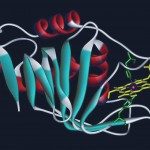Link to Pubmed [PMID] – 9771966
Oncogene 1998 Sep;17(10):1235-43
The murine TS1alphabeta T cell line expresses the anti-apoptotic protein Bcl-2 upon IL-2 stimulation, whereas IL-4-mediated growth of this cell line proceeds in the absence of Bcl-2 expression. In addition, IL-4 stimulation inhibits Bcl-2 expression and modulates its mRNA level. IL-2-induced DNA binding activity for these transcription factors is sensitive to phosphatidylinositol 3 kinase inhibitor wortmannin and to Rho inhibitor Clostridium difficile toxin B, which inhibit IL-2-induced Bcl-2 expression. NF-AT transcription factor appears to be the most important in the control Bcl-2 expression, since inhibition of the calcium-calmodulin-dependent phosphatase calcineurin, which regulates NF-AT activity, downregulates Bcl-2 expression in IL-2-stimulated cells. Constitutive expression of this phosphatase also upregulates Bcl-2 expression in IL-4-stimulated cells. In addition, a dominant negative NF-AT expression vector downregulates Bcl-2 expression in IL-2-stimulated cells. These results suggest that IL-2 induction of Bcl-2 expression may be directly or indirectly mediated by NF-AT.

